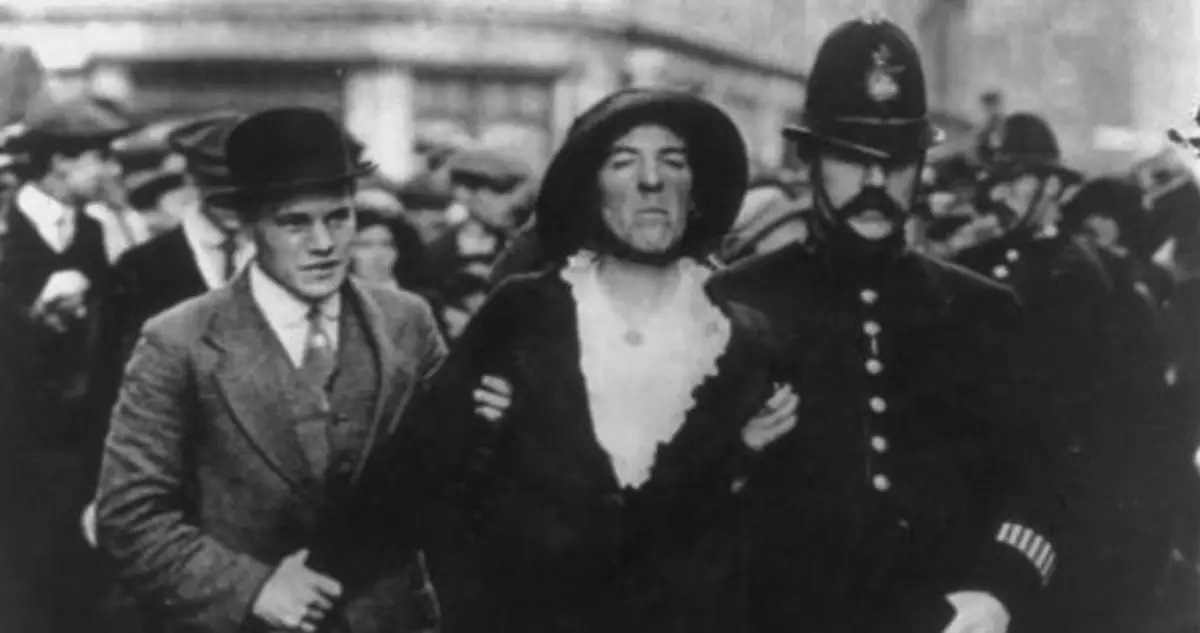03.26 | being angry and a woman (happy #whm)
What made me happy was that I had finally gotten to a position where I had all the power over myself. That even though the situation sucked, I didn't have to acquiesce gently or pretend I was into it.

We hold these truths to be self evident that all men are created equal. And when I meet Thomas Jefferson Ima compel him to include women in the sequel (work).
– Angelica Schuyler, The Schuyler Sisters, Hamilton
✉️ letter #31
I'm one of those Hamilton fans that was absolutely 100% on board as soon as the soundtrack came out on Spotify. But as much as I loved the music, one thing always bothered me about the concept in general.
As exciting as it was to see black and brown and yellow bodies enacting our founding myths, the very act of them being there - completely uncommented on and otherwise reflecting unquestioningly the progressive values of our current times - felt like it was in a way erasing the very real, very hard struggle to get where we are today.
I first felt that twinge of discomfort when they took a moment to spotlight the heroic spy Hercules Mulligan, who was played in the musical by Okieriete Onaodowan, but in real life was a slaveowner whose slave ended up doing most of the intelligence work. The slave was never named.
And lately, for whatever reason, I've been thinking about this throwaway line in the quote above by Angelica. It's a wink wink to us ladies in the 21st century, now that we have rights and our own bank accounts and can run for government positions even... but if this song took place in 1770s, it would be nearly 150 years before Angelica would have been allowed a vote (and another 40 for actress Renee Elise Goldsberry to have her enfranchisement fully defended by the law). Jefferson did not include it in the sequel.
We are, after all, only now possibly confirming our first ever Black Woman to the Supreme Court. And the absolute joke of a confirmation hearing that Judge Ketanji Brown Jackson was being put through kind of shows how far we have to go.
Watching her, cooly and carefully lob back the absolute dumbest questions about "racist babies" and "CRT" and "what would you do if we cornered you about your sexually harassing past (that you don't have, unlike the guy who was actually "cornered" about it)?" is both a little funny and a lot exhausting.
So many of us women have been put in this position: where men with questionable qualifications and demonstrably little sense force us to smile and bear with it as they cover us with their absurdity.
Where the only thing we really can do when faced with this audacity is to raise our eyebrows a bit, take a deep breath, and find a gentle path outwards that doesn't make us seem "disagreeable," "naggy," or god forbid "angry."
One of my last experiences at my previous job was a moment of ice cold rage at my boss. I won't go into details, but it was the culmination of many undermining interactions stacked upon each other - multiple times where we'd reached a consensus that he then walked back on, because ultimately, logic be damned, it wasn't what he wanted to do.
In this case, when he couldn't make a convincing argument that stopping my project made any sense for our company goals (it didn't), he just told the people I had commissioned to work on it that it was cancelled without telling me. Because it affected everyone's strategy for the week, I chased him down as soon as I found out, cooly but firmly told him that going behind my back to mess up everyone's schedules was incredibly unprofessional and that at the very least, this week's tasks would go forward as planned.
I then spent the rest of the day reaching out to my network to discuss new opportunities for employment.
I was proud of myself in that moment that, as upset as I was, I'd handled it with spine straight and righteous. That unlike previous bad boss situations, I hadn't felt any tears coming on. My thrumming adrenaline had focused into a pinprick of unquestionable authority to solve things while also demanding I be respected.
I mentioned this to other women, who were dismayed that I was portraying crying as weakness. We should allow and normalize all natural emotive reactions, especially when they tend to be gendered, they argued.
I can only respond thatwhile I don't believe that there's anything wrong with crying, ultimately I think we cry as a natural response to being frustrated by our own feelings of helplessness. Often that feeling is true and it's not our fault. The power dynamics at play just make what we're dealing with insurmountable.
What made me happy was that I had finally gotten to a position where I had all the power over myself. That even though the situation sucked, I didn't have to acquiesce gently or pretend I was into it. That there wasn't a damn thing this guy could do to me while I expressed that his actions reflected badly on him.
I still have memories from when this wasn't at all possible. When being cornered by an older man, or having my hard work publically disparaged by a coworker, or any other dozens of the potentially career-destabilizing acts by other people would push me to leave the room so I could cry out my helplessness. I couldn't fight back - I didn't have the experience, and they had the power to put the kibosh on all of my goals. I was happy to be free to be angry.
This Women's History Month, I've been reading through Rebecca Traister's 2018 book Good and Mad: The Revolutionary Power of Women's Anger.
Written just a few years after #metoo kicked off in a big way, it's an excellent recounting of the century (honestly, centuries) of work that's gone into the women's movement in order to even create this seismic shift in accountability. It's also a very thorough recap of the pushback and male handwringing and thousands of reminders that we still have a ways to go.
It's taken me over a month to get through this book, even though it's a very eloquent and well-paced read. Considering I was one of many #metoo voices recounting all the fucking bullshit I'd experienced in my 20s (a very long list, but not even close to the longer ones I know that exist) recalling all of that in all its connected ignomy felt exhausting.
I highlighted a lot of passages in preparation of conversations I know I still have with men who still won't admit that it was "kinda weird" that the PMC (Professional Managerial Class) conversation was centered so hard around Elizabeth Warren and not any of the guy politicians, all of whom were also Ivy League graduates who managed their teams, often less competently than Warren did. And then the thought that I still had to have those conversations made me want to lie down.
But there really is so much of the book that's worth quoting. So here's one segment to convince any of you who haven't read it yet, to check it out:
The ability to feel the anger and convey it to others is itself the transformative experience for many women. Women’s anger spurs creativity and drives innovation in politics and social change, and it always has.
In the nineteenth century, women who previously had been kept largely isolated in their domestic spheres, bound by the gendered responsibilities of wifeliness and motherhood in the agrarian economy of the early Republic, began to come together thanks both to the religious revivals of the time and the industrialization that brought many of them into factories as workers and into schools as students and teachers. Once they gained access to one another, the ability to communicate their anger—over the enslavement of African Americans, over their lack of a franchise, over the dangerous working conditions many of them faced, over the drunken domestic abuse many women suffered at home—quickly produced agitation that would become the abolition, suffrage, labor, and temperance movements...
Anger has driven women to develop a million approaches to changing the world. It’s prompted some to put the sources of their pain and suffering on display: from Mamie Till’s determination to show the world her son’s battered dead body to the editors of Ms. magazine, who in 1973 published a photo of Geraldine Santoro, a Connecticut woman who’d bled to death after an illegal abortion, to Diamond Reynolds, who in 2016 live-streamed the murder of her boyfriend, Philando Castile, by policemen, as her four-year-old daughter watched in terror from the back seat.
Anger has prompted women to make radical art—from novels of sexual liberation, like Erica Jong’s Fear of Flying, to poetic theater, like Ntozake Shange’s For Colored Girls Who Have Considered Suicide/When the Rainbow Is Enuf—and to create better medical and sexual education materials, like Our Bodies, Ourselves, which taught generations of women around the world about their anatomy, about sexual pleasure, and about their reproductive options. Anger has led academics to recover and reclaim women’s share of the academy, creating new fields of women’s and gender studies and remaking university curricula.
Women’s anger has led to entirely new forms of civil disobedience: In 1965, a University of Chicago student named Heather Booth helped a friend’s sister get an illegal abortion. When other women began to call for help, she and a cohort of young feminists began to develop an elaborate system of phone numbers, code words, and houses that would be known as the Jane Collective; they would assist more than eleven thousand women in getting safe abortions between 1969 and 1973.
The 2016 presidential victory of an unqualified and monstrously abusive white patriarch over a qualified female competitor provoked rage in direct response to that loss, rage that quickly prompted political reaction and certain kinds of creative new activism.
Everywhere you turned in 2017 and 2018, new ideas arose, fueled by women’s fury, including the TIME’S UP movement and its Legal Defense Fund, established by the women of Hollywood as an attempt to redistribute economic resources to afford women in other industries more stability to come forward with harassment claims…
As Catharine MacKinnon herself declared in 2018 about the innovations of the #metoo movement, it “is accomplishing what sexual harassment law to date has not . . . This mass mobilization against sexual abuse . . . is eroding the two biggest barriers to ending sexual harassment in law and in life: the disbelief and trivializing dehumanization of its victims.”
In MacKinnon’s view, it was the surging movement itself, and the emotions—the rejection, the unwillingness to look away any longer; in short, the anger it had drawn forth—that was shifting what the law had not been able to: the culture, our shared assumptions assumptions.
“Revulsion against harassing behavior . . . could change workplaces and schools. It could restrain repeat predators as well as the occasional and casual exploiters that the law so far has not . . . this uprising of the formerly disregarded . . . has made untenable the assumption that the one who reports sexual abuse is a lying slut, and that is changing everything already.”
You can get the book on Bookshop.org (the independent alternative to Amazon).
🌱 the ethical ideas newsreel

- Nature magazine is highlighting the excellent photography of marine biologist Alexander Semenov, whose work has helped shed light on the magical world of our ice cold oceans.
- FastCompany seems convinced that, unlike in recent history, there might actually be some hope for a Billionaires Income Tax in the United States.
- Speaking of good but doubtfully feasible law proposals in the USA, the SEC has said that publicly traded companies should report information on their greenhouse-gas emissions and even those of their suppliers and consumers. It's one of the Biden administration’s "most sweeping environmental actions to date."
- Researchers from Cambridge have improved the fuel production efficiency of biological enzymes by 18x in a laboratory setting - which could utilize existing CO2 to produce green fuels.
- The four day workweek is a great idea, but it's especially great for women, says Jacobin: "Taking into account domestic and caring responsibilities, women work more hours per week than men on average — and their pensions are still far smaller than men’s. That’s not a fair deal. A four-day workweek can help get us on the track to equality."
🎵 song of my week
Joy Oladokun is a Nigerian-American songwriter whose song smoke kind of gives off a Tracy Chapman but in the 2010s vibe.
Smooth, soulful and melancholic. Idk, it just hits right right now.
✨enjoying: one final piece of pop culture fun
Did I expect to be utterly destroyed by this random anime on Netflix about a precocious preschooler who moves into an apartment complex and befriends his manga artist neighbor? No, of course not.
What about this premise would make you assume the series would touch so hard on tough issues like the psychology of poverty and attempts to escape abuse and the many faces of undiagnosed depression? It's not dark though - in fact, all of those hard lessons are couched in what is otherwise a cute and funny slice of life show. You should watch it and like, happy cry every episode.
Did you enjoy it?
Stalk me on Social Media




